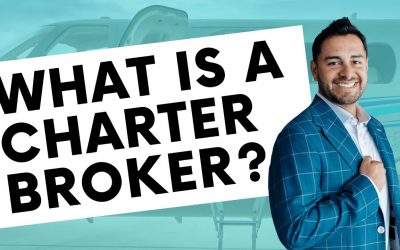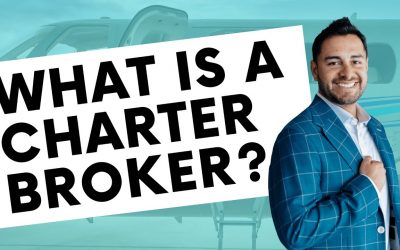How to become a Charter Broker?
The role of a Charter Broker in the world of private aviation is essential and intriguing. Charter brokers act as intermediaries between jet operators and clients, ensuring the smooth organization of private jet charter flights. Becoming a charter broker requires a mix of industry-specific knowledge, excellent customer service skills, keen sales acumen, and a vast network of both clients and operators.
If you’re considering a career as a charter broker, it’s important to understand what the job entails and the steps necessary to succeed in this exciting and challenging field. From acquiring necessary knowledge and skills, building a reputable client base, navigating through legalities, to managing financial aspects and establishing relationships within the industry, this journey is filled with opportunities for learning and growth. Here is a step-by-step guide on how to become a successful Charter Broker.
How to become a Charter Broker?

To become a charter broker, one typically needs a strong background in sales or customer service, ideally within the aviation industry. Understanding the intricacies of the aviation market, including the types of aircraft, their capabilities, and costs associated, is a fundamental part of the role. Here are some steps to become a charter broker:
Education: A bachelor’s degree in a related field like business, marketing, or aviation management can be helpful.
Gain Experience: Working in the aviation industry, particularly in areas related to customer service, logistics, or sales, can provide valuable experience. This could involve working at an airline, for a private jet operator, or another broker.
Obtain Certification: There are organizations like the Air Charter Association that offer certification programs and training for brokers. These can provide credibility and industry recognition.
Network: Build relationships with both operators and potential clients. Attending industry events and joining professional organizations can help in this aspect.
How the Charter Broker business model works?
A charter broker acts as a liaison between clients looking to charter a private jet and the operators who own and manage these jets. They do not own the aircraft themselves; instead, they find the best fit for their clients based on their needs, negotiate prices, and coordinate the logistics of the trip. They earn money by adding a margin or commission to the price that the operator charges.
Charter Broker: What is the business margine?

The business margin in the private jet charter broker industry varies greatly, depending on numerous factors such as the type of jet, flight distance, duration, and additional services requested by the clients. However, it’s common for brokers to charge a commission, which typically ranges from 5% to 15% of the charter price.
One important point to note is that brokers do not own the aircraft; they are intermediaries who facilitate the transaction between the jet operator and the client. Hence, their earnings are entirely commission-based. This commission not only covers their services but also contributes to the company’s overhead costs, including office space, staffing, marketing, insurance, and more. It’s also important to remember that the broker’s main value lies in providing clients with access to a wide variety of aircraft, along with expert advice on which jet would best suit the client’s needs, ensuring safety, convenience, and competitive pricing. Thus, while the commission constitutes their primary income, the quality of service they deliver significantly influences their overall business margin.
Remember that while these figures provide a broad understanding, actual earnings and margins can vary significantly based on market conditions, the broker’s reputation, their negotiation skills, and the specific deals they’re able to secure. Please consult industry-specific resources or speak with professionals in the field for more detailed information as of your specific time of interest, as conditions can change rapidly in the aviation industry.
What are the risks about Charter Broker?

Some risks associated with the charter broker business include the variability of the market, potential for unsatisfied clients, and liabilities associated with flight operations. If a broker does not accurately communicate the terms of the charter or fails to organize all aspects of the flight correctly, it can lead to disputes or loss of business. Additionally, as brokers are dependent on operators for the actual flights, any operational issues or financial instability on the operator’s part can directly impact the broker.
The charter broker business model does have its fair share of risks, as with any business venture. These are a few of the potential risks:
- Market Volatility: The demand for private jets can vary depending on economic conditions. During economic downturns, the demand for private jet charters may decrease, which can impact a broker’s revenue.
- Client Satisfaction: Charter brokers must meet high expectations set by clients who are typically paying a significant amount for private charter services. If a client is dissatisfied with the service — for instance, if the flight is delayed or cancelled, or if the aircraft does not meet the client’s standards — this could result in loss of business and potential legal issues.
- Operational Risk: While the charter broker is not responsible for the operation of the aircraft, they are reliant on the operator to deliver a smooth and safe flight. If the operator fails to do so due to mechanical issues, staffing problems, or other factors, the broker could face reputational damage and potential liability issues.
- Regulatory Compliance: Charter brokers operate in a heavily regulated industry. Ensuring compliance with all relevant local, national, and international laws and regulations is essential to avoid legal issues and fines.
- Liability Risk: While charter brokers typically have insurance to cover potential liabilities, the risk remains. For example, if an accident or incident occurs during the charter flight, the broker could potentially be implicated, especially if there is a dispute over responsibility or a failure to adhere to safety regulations.
Starting a charter broker business requires careful planning, comprehensive understanding of the industry, and a strong risk management strategy to mitigate these potential challenges. It is recommended to seek legal and business advice before venturing into this business.
How to start?
To start a charter broker business, one would need to first establish a business entity and comply with any necessary legal and regulatory requirements. This involves creating a business plan, identifying target markets, and understanding the competitive landscape. It’s essential to build relationships with reliable operators and potential clients. Developing a robust contract that clearly outlines the responsibilities and liabilities for all parties involved is also crucial. Finally, offering excellent customer service and building a reputation for reliability and transparency can help to grow and sustain the business.
Developing Expertise:
One of the key factors in becoming a successful charter broker is to develop a deep understanding of the private aviation industry. This includes understanding different types of aircraft and their capabilities, as well as staying up-to-date with market trends and prices. Joining industry associations, attending trade shows and conferences, and constantly learning about new aircraft and operators can help in this regard.
Building a Client Base:
Building a client base requires time, patience, and excellent customer service. Networking can play a crucial role in finding new clients. Once a client is acquired, providing excellent service, being responsive, and delivering on promises can help retain them and earn referrals.
Legal and Regulatory Considerations:
Charter brokers operate in a heavily regulated industry, so understanding the relevant laws and regulations is vital. This includes understanding the regulations related to air travel, privacy, and consumer protection. Having a strong contract that protects the interests of the broker, while also being fair and transparent to the client, is important.
Intro The Brutal Truth… Being a Private Jet Charter Broker

Financial Considerations:
Starting a charter broker business can require a significant investment. This includes the costs of establishing the business, marketing, and possibly hiring staff. Furthermore, the income of charter brokers can be highly variable, depending on the number and size of the charters they arrange.
Building Relationships with Operators:
A key part of the charter broker business is building relationships with operators. These relationships can help ensure access to aircraft when needed and might lead to better prices.
Future Outlook:
The demand for private air travel is expected to continue to grow in the future, providing opportunities for charter brokers. However, competition is also expected to increase, so being able to differentiate oneself and provide superior service will be crucial.
All in all, becoming a successful charter broker requires a mix of industry knowledge, sales and customer service skills, and a strong network of both clients and operators. It can be a challenging but potentially rewarding career for those who enjoy the dynamic world of private aviation.




